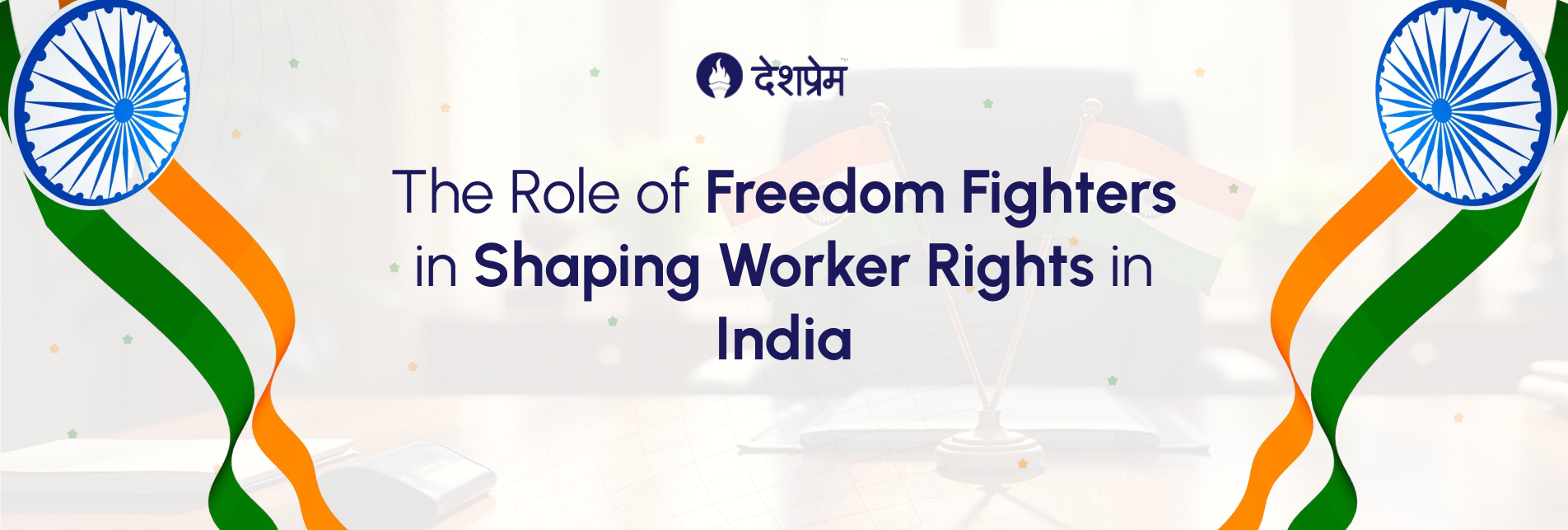No products in the cart.: ₹0.00
The Role of Freedom Fighters in Shaping Worker Rights in India

India gained independence through a historical movement that unified political transformation with economic awakening processes. The main emphasis in most historical accounts examines heroes’ colonial resistance, but their supporting efforts for worker rights in India make an equally significant contribution to their legacy. During their fight against bonded labour, freedom fighters maintained a vision that future workers should enjoy equal rights and appropriate treatment at work.
Early Voices for Labor Justice
Labour exploitation in British India reached its peak when textile mills combined with plantations and railways increased in number during the late 1800s. Leaders Dadabhai Naoroji and Gopal Krishna Gokhale started pointing out both the economic drain and Indian worker conditions during this time period. Through their speeches and literary works, these leaders exposed the system of unfair worker treatment, which the freedom struggle directly connected to economic justice. Public awareness rose through generations to inspire both reformers and entrepreneurs who established modern labour rights that benefit the Indian flag manufacturer and other traditional industries.
Gandhi’s Contribution to Labor Movements
Mahatma Gandhi contributed significantly to raising worker standards, as demonstrated by his involvement during the 1918 labour strike of Ahmedabad mill employees. The labour negotiations under Gandhi used peace-based morality, and he advocated for self-sufficiency through khadi manufacturing and village industries. True independence existed only for workers when they gained freedom from workplace exploitation, according to Gandhi. The efforts of Gandhi enabled workers to unite into labour unions so they could secure better pay, which remains significant even now. The Independence Day t-shirt we proudly showcase stands as a dual representation of both national pride and the fair workplace standards that benefit manufacturers.
Building Post-Independence Labor Laws
India’s independence brought about a continuation of freedom fighters’ influence on its national labour policies. Leaders Jawaharlal Nehru and Subhas Chandra Bose wanted India to become a socialist nation that cared about workers. Labour institutions, together with trade unions and minimum wage laws, emerged from their structured reform efforts. Post-independence reforms founded the rights workers receive today, which include both restricted working hours and social security benefits, due to the efforts of those who fought against colonialism.
Modern Reflection of Their Legacy
The freedom fighter ideals continue to thrive throughout the nation through workplaces that respect ethical employment standards. Every sector comprising technology, manufacturing, and retail relies on India’s workforce to maintain its ongoing development. The Indian flag for the office table functions as both an emblem of pride and a reminder of the importance of providing fair treatment to all workers standing behind it.
Conclusion
India’s freedom fighters fought to remove foreign control of the country, but they dreamt of creating a society that valued dignity for all individuals, including workers. Their vision served as the essential framework that established the current labour rights standards. We must defend these rights today to maintain the freedom values they described because the work environment should reflect their message of dignity for every worker.
Explore our collection of patriotic merchandise that honours the spirit of freedom fighters and the dignity of every worker. Shop now to wear your pride and support Indian craftsmanship.




